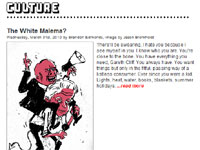There's a new entrepreneurial kid on the online magazine block and according to its founder, Andy Davis, it has been growing exponentially since its birth in April 2009. Mahala is a youth-orientated publication that provides a different perspective on current affairs, popular culture and just about anything sparking conversation in South African social circles.
"We cover things that, in so many ways, just fall into our orbit. Between Roger (Young), Shaun (O'Toole), Carlos (Amoatou), myself and Montle (Moorosi), we spend a lot of time looking at what's blowing up on the internet, and in SA through overheard conversations and basically whatever's going to give you a little bit of insight into what's new and what people think is cool," says Davis during an interview with Bizcommunity.com.
Current sections on Mahala include Art, Culture, "Kif or Kak", Leisure, Movies, Music, Reality, Sport and Surfing. Nichéd toward South African creatives, Mahala isn't your run of the mill youth mag - it digs deep and gets into the nitty-gritty of every topic handled, be it Alice in Wonderland or the "misappropriation of coloured culture" by SA YouTube phenomenon, Die Antwoord.
Locking horns with the hater generation
What's evident from Mahala is not just that everyone has an opinion, but most of them desire a forum to share it where they can argue amongst their peers until they're blue in the face. From its comment boards it's clear that Mahala has indeed attracted what Davis deems, the "hater generation":
"We get a lot of flak for the kinds of comments that we attract on the site and it's a bit of a hater generation at the moment. People are quite negative about new creativity - in a way that's kind of the democracy of the web - if you allow comments, often people just snipe and I don't think it's particularly conscious. I don't think it's particularly positive and a lot of people call others out on that."
It is however the content Mahala publishes that drives these sometimes long winding debates - Mahala is all about telling it like it is, whether the truth hurts or not. According to Davis, the South African public's standards of creativity when it comes to the country's own culture are just not high enough - accepting mediocre productions out of empathy:
"When it comes to culture there's this whole kind of dogma in SA culture circles that you shouldn't diss people who are creating SA culture. We certainly don't just buy into that. Everything just gets 6 out of 10 regardless of whether its good or bad and then inevitably what you get is people who shouldn't have actually survived as artists stuttering along and no one has the guts to say, 'Hey, listen buddy...' So what we're trying to do is, if something's rubbish say that it's rubbish and if it's excellent, say that its excellent."
The Mahala team is made up of Andy Davis - editor/publisher, Susie Davis - web developer, Roger Young - Durban-based deputy editor, Shaun O'Toole, Carlos Amoatou, Brandon Edmonds and Justin McGee as writers, photographers JR and Youngugnga, and Montle Moorosi. Illustrations on the Mahala website were done by Kronk. While the team is scattered across the big metropoles of SA, future plans for Mahala include setting up bureaus in Cape Town, Joburg and Durban.
Expanding into Africa
Davis's future plans also include expanding Mahala into various regions across Africa: "We have big expansion plans not just for Mahala South Africa, I think there's such a huge opportunity to start representing what's going on in the rest of Africa in terms of music culture, reality, politics, social commentary, political commentary from an African perspective."

Andy Davis
During 2010, Davis plans to send a team of one journalist and two photographers to set up a photographic studio in Kinshasa, DRC where they will run weekly blogs in order to provide their perspectives of what is happening in the Central African country - providing a new content stream for the mag. If all goes to plan Davis plans to look into the Ugandan, Ethiopian and West African markets.
"I think all those West African countries have an amazing civil and artistic society that goes straight to France. I think we, as the most developed African country, are left out of what's happening in Francophone Africa and I think there's definitely an audience both international and local for that kind of stuff so I think that's the kind of direction I want to move in.
"Our culture seems to be so diffuse and so navel-gazing in so many ways - I think maybe it's because we have too much structure in South Africa, too much infrastructure, too much first-world existence that people live in a first-world bubble in a lot of ways. Whereas in Lagos you can't live in a first-world bubble - it's a lot more homogenous in ways - the poverty's homogenous. I find those kinds of things really interesting and I think the rest of the world will too.”
Mahala goes to print
A collector's edition of the first print copy of Mahala is in the works, being designed in partnership with illustration company, Am I Collective. The main touch point will however remain the website.
Mahala projects
The name of the publication stems from a philanthropic project Davis started in 2001 collecting used wetsuits and surfing gear for underprivileged youth around the country.
"When we were looking for a name to call our magazine we wanted it to be something that was distinctly African and we were playing with all kinds of concepts and then thought, why not call it Mahala - we already own it and it encapsulates a lot of what we're trying to communicate and it fitted really well so without destroying the surf project we just basically streamlined."
Mahala now runs stories about the surf initiative and carries out brand activations around it as an extension of the online magazine. Davis plans to eventually start running workshops on media production with the children which could develop into another content stream for the company.
Another project on the Mahala agenda is publishing a music album with J-Bonez from Fuzzygish and other collaborators making old school folk music around relevant issues. "We'll have a show at OppiKoppi this year - Mahala presents Citizen Bones - and we'll have a nice audio-visual display and just belt out these angry lyrics," says Davis.
Facebook demographic
Davis has engaged his audience through social media platforms Twitter and Facebook. Mahala currently has a Facebook fan base of 2366 and uses this number as demographic research in sampling its audience. According to Davis, at this point the demographic results reflected are where he envisioned the magazine being pitched - it's an integrated audience with 50:50 male and female, it's spread around the big South African metropoles and a few people who left the country and want to stay in touch with it.
"Our hits are up 26 600 and of that 15 000 uniques and that's really just suddenly. But generally it's a real labour of love and also you're also only really as strong as your last content - you try and keep those debates going, you try and keep the elevation of the stories and the relevance of the stories top of mind."
How the idea was spawned
Davis, after graduating with a BA in English and Politics at UCT and Honours in Fiction, became a staff writer at SL Magazine. He eventually took over editorship of the publication in 2002 but in 2003 moved into freelance writing and teaching at UCT. He then started his entrepreneurial career designing branded content, magazine-style websites for corporate clients.
"By April 2009 I realised it's time to start my own magazine, because as opposed to being kind of beholden to one client, you can actually produce the kind of content you want, which I think there's a real gap in the market for. You can hit on any corporate client in South Africa and get them in as an advertiser, so that kind of model made a lot more sense. We still do a fair amount of branded content around the company Jingo, but the main focus at the moment is just Mahala," says Davis.
Ruffling feathers and gaining investors
Mahala's complement of writers while eloquent and clearly intelligent have been called out on numerous occasions as being too cynical and with a byline in its header that used to read "Who can you trust?" changed recently to "Though is free," it seems the feeling was amplified in the articles published.
"I find it hard not to be [cynical] because in a way I think the zeitgeist of media workers who are involved in the discourse of culture tend to be quite jaded. It's a cynical world although we try and keep it progressive and upbeat and positive and sometimes by being honest to how you would respond to a subject is cynical. What we try to do is just make it relevant, so if it is cynical at least try and give some kind of value to it beyond coming across as some grouchy dude in suburban SA," says Davis.
Gaining financial confidence from corporate SA for a start-up can be quite daunting though even if your message boards are overflowing with eager participation - negative and positive. Davis admits that businesses are quite conservative in what they support for fear of a wasted investment in a fly by night operation.
"You can be the hottest thing in town and you get all these kudos from people who tell you how much they love you and how amazing you are but it's not from people who actually want to spend money on you - it's from your contemporaries...It's definitely fulfilling on so many levels for me so we'll keep going for as long as we can with or without money."
Check out the Mahala website on www.mahala.co.za.
















































